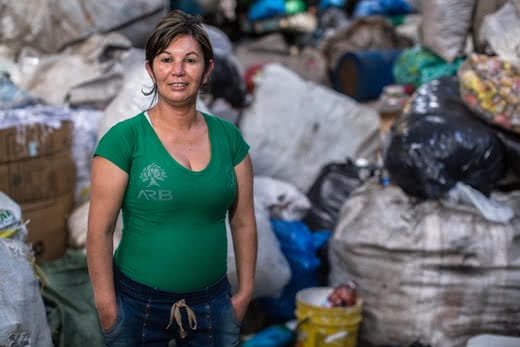
Photo: Juan Arredondo/Getty Images Reportage
This year’s Human Development Report, the United Nations Development Programme’s flagship publication, revisits the relationship between work and human development. The report argues that work can act as a catalyst of human development, among other things, because it allows people to earn their livelihoods; it is a way of participating in society; and it provides security and a sense of dignity. The relationship, however, can also go in the opposite way if work is hazardous; if it doesn´t provide security measures; if labour rights are not respected; or if social protection is lacking. In the absence of adequate policies, the existing unequal opportunities and incomes among workers could lead to societal division and perpetuate inequalities in the world.
The three-decade-long struggle of waste pickers in Bogota is a good example of both the risks these workers face in the absence of adequate legislation and recognition, and how the recognition of their rights, including their right to work, can lead to fundamental changes in the lives of waste pickers.
"By generating our own work we stop being a burden to the State and we also help to build value chains that have social, environmental and economic impacts."
The WIEGO Blog spoke to Nohra Padilla, director of the Asociación de Recicladores de Bogotá (ARB), about the work undertaken by ARB to get recognition and defend the rights of waste pickers in Bogotá and the impact of what they have achieved.
An important part of your struggle for recognition was articulated around the right to work. Why was it important to do that?
NP: The struggle was articulated around the right to work precisely because [waste picking] is an occupation that generates a series of activities and work tasks that enable recyclables to be fed into the value chain and that enable the livelihoods of thousands of families. The only way to earn a livelihood is through working.
Read about the struggle and achievements of waste pickers in Bogota
By generating our own work we stop being a burden to the State and we also help to build value chains that have social, environmental and economic impacts. We have become managers of the processes involved in recycling. We create benefits to society that had not been recognized previously.
Our occupation generates a lot of economic activities, and, as such, it falls under the body of legal instruments to protect the right to work and the right to earn a livelihood. We have structured our struggle in defence of our rights using the legal and constitutional instruments that exist in Colombia, which are also supported by many international agreements. For instance, Colombia is part of the International Labour Organization (ILO). During the last decade the ILO has reinforced the instruments for decent and dignified work ‒ not employment.
For background information of the legal strategy used by ARB in defense of the right to work
What are the main achievements of waste pickers in Bogota, through the work of ARB, in the defense of work?
NP: At the beginning, we wanted to be able to work, to remain in this occupation, even if we still had low incomes and non-decent working conditions. Now, waste pickers in Bogota have succeeded in having the occupation that we have done generation after generation, and in obtaining economic recognition for the tonnes of materials we collect rummaging through waste containers, for transporting them, and for making all those materials accessible through a recycling process.
Watch this video for background information on what waste pickers in Colombia have achieved
I think that ARB, in tandem with the Asociación Nacional de Recicladores (ANR), managed to make a difference because we were always very clear that we needed to have a response from the whole sector, that we couldn´t negotiate things that would only benefit a few people. We had to negotiate for the general benefit of all waste pickers and, if possible, [the other actors in] the value chain.
What is the lesson here for human development?
NP: Waste pickers are now conscious that their work is becoming important. They know that because of their work they are being paid a fee in addition to the money they can obtain by selling the materials they recuperated. They have started to understand their role within the system, and they have started to value their work.
What are the risks that you continue to face in your work?
NP: We continue facing the risk of being displaced from our work. Other actors want to take over waste pickers’ rights to seize the earnings coming from the sale of materials, and the payment for providing a public service. Insufficient coordination between waste pickers’ organizations is also a risk, because they represent the struggle and the defence of these rights. Another risk is the underestimation of the contributions made by waste pickers by collection of thousands of tonnes of materials.
Top image: by Juan Arredondo/Reportage by Getty Images
Related Posts
-
Informal Economy Topic
-
Occupational group
-
Region
-
Language
